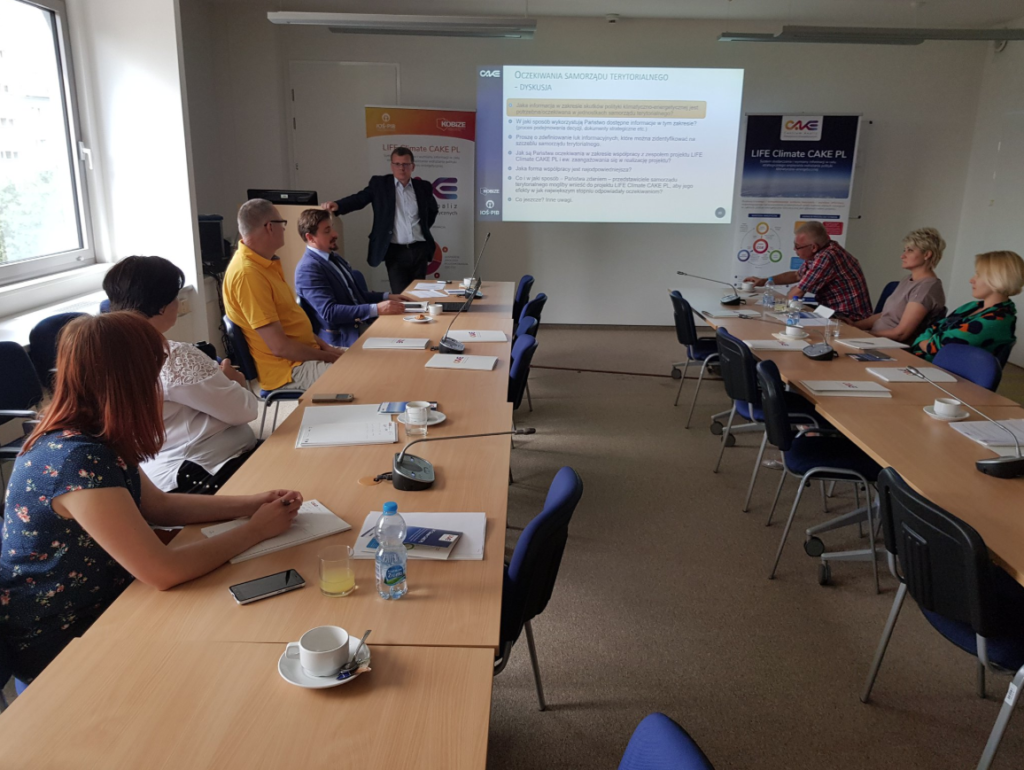Meeting with local administration representatives
On June 19, 2018, a meeting was held with the representatives of the local administration, which could potentially be interested in the results of the LIFE Climate CAKE PL project.
Meeting of the representatives of local governments from various positions at various levels of local administration, i.e. gminas, poviats, voivodships, cities, allowed to get to know a wide spectrum of interests and needs.
Within the project the action is planned to provide analyses from the developed models to representatives of local authorities and enable their use in strategic and planning documents prepared at the local level. The project team will prepare a special report in the form of a guidance, which will contain the results of analyses at the sectoral level and advices on practical applications at the level of local administration. The solutions proposed in the guidance would help to implement and adjust the EU and national climate and energy policy into local activities, including the development of local policies, strategies and plans (e.g. sustainable transport strategies, agriculture, energy supply plans, development of renewable energy sources, energy efficiency improvement, smart grids etc.).
On the basis of the discussion during the meeting and the questionnaire carried out as part of the project, the most significant topics in the opinion of the local administration were selected which the LIFE Climate CAKE project could analyse.
Stakeholders at the local level would be interested in analyses in the range of thematic areas as follows:
- Energy and climate policy (in general) – long-term effects, in particular financial at the level of the national economy, for various economic sectors and the society; development of the permanent long-term direction for the climate and energy policy regardless of political conditions;
- Support policy – unambiguous information on possible and supported directions of activities in the scope of emission reduction, including in the field of fuel and fiscal management;
- Public transport – impact on the level of global reduction, in relation to other emission sources, possible cost-optimal action scenarios;
- Agriculture – information and data on the main sources of emissions and their impact on the economy, information on more niche subsectors, i.e. on pond fish farming;
- Fossil fuels, renewable energy sources and nuclear energy – information on an optimal system and long-term solutions in the area of energy and raw materials policy of the state and the effects of this policy, forecasts of fuel, electricity and heat costs;
- Energy efficiency – setting directions for development and support;
- Prosumer energy – setting directions for development and support;
- Rural areas – impact of energy and climate policy and possible directions of emission reduction;
- Proposed directions for funds spending at the governmental level – information about long-term government policy in the field of climate and energy in terms of support;
- Proposed changes in the legislation in the field of climate and energy policy – setting directions for legislation on the basis of information about long-term government policy in the field of climate and energy;
- Possibility to take into account the shadow economy in particular sectors – in the scale of the country, the functioning of entities outside official statistics is usually marginal, but for some areas at the local level it is important.
According to the suggestions of the representatives of local administration next meeting could be organized in another Polish city, so as to facilitate access to knowledge in the field of energy and climate policy also for local administration from a different location than Central Poland. An important element from the point of view of local administration is a well-functioning e-mail exchange, a website with an information centre and a login portal, the ability to exchange information and discussions, consultation the current stages of the project or draft guidance. Additionally, in the opinion of participants, in raising awareness and reaching people who would be interested in the project, not only direct networking, but also official invitations for example via trusted profile (ePUAP) would be useful.


 Reset ustawień
Reset ustawień Kontrast
Kontrast Widok
Widok Czytelność
Czytelność Czcionka
Czcionka Znaki
Znaki Interlinia
Interlinia Słowa
Słowa Akapity
Akapity Deklaracja dostępności
Deklaracja dostępności









